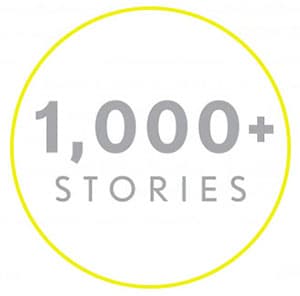This story is part of our 1,000+ Stories campaign. What’s your story?
Name: Sophie Slater
Business: Birdsong Limited
Location: London, United Kingdom
Industry: Apparel & Accessories
Reason for starting? My business partner and I met while we were both working for charities. I’d experienced body shaming and unrealistic beauty standards while being signed as a teenage model and working in chain store American Apparel. Sarah was working at an elderly people’s day centre, and the knitting circle there kept churning out scarves, because it’s so calming, meditative, helps with arthritis and helped the women there feel purposeful. But they were selling them at bring-and-buys for a fiver, while stressing about funding opportunities for the centre at the same time. I was working for women’s charities and doing feminist activism, but every women’s group I worked with saw their funding get cut to shreds. Street casting, working with feminist photographers in our network and doing work to include women left out by budget cuts felt like a good way to start out a fashion brand that we really believed in. All the pieces of the puzzle were there.
Our approach is a whole picture one: we work on a promise of no sweatshops and no photoshop. All our clothes are made by women’s groups and charities with rare skills. We pair their expertise with our designs, creating wearable pieces with a mind to the future. From migrant seamstresses to knitting grannies, we’re connecting women from worker to wearer. Most of these charities are based in London and support women on low incomes, migrants or women with significant barriers to work. We pay them at least a living wage to manufacture, which in turn benefits them and their charities. We show the reality of women, making more of us visible. Your body suits you. Dress it in Birdsong.
Related: Read about another fashion entrepreneur here.
How do you define success? My definition of success would be to have created something beautiful, sustainable and robust that our women’s charities can rely on for funding. We’re getting there, but I’d love to see women’s organizations thriving, not just surviving. Our definition is to create a business without exploitation of women, people or the planet, and to change the parameters of what people see as achievable when it comes to fair business.
Biggest success: Our crowdfunding round overfunded by £11k, and we reached our target in 3 weeks. Over 300 people invested in our small company, which to me shows how much people believe in us. We were able to buy so much stock from our charities, raising the revenue we’ve made for charitable groups to £40,000. This was all after being told that we’d find it hard to raise investment, and wouldn’t be taken seriously as young women entrepreneurs aged 25 and 26.
We have our first, fully own-line label launching at the end of October, with around 30 pieces in custom prints and the most gorgeous shapes and fabrics. We want these to sell out and have a wildly anticipated next collection. We’ve really road tested the designs to ensure that women feel comfortable, powerful and amazing in them, and are hoping to gather feedback that affirms this, and to make our next collection even better. We’re also popping up in Berlin, Warsaw and twice in London in the run up to Christmas. We’ve sold to 20 countries but would love to become a fully global brand. We want to be the most exciting ethical fashion brand, and to change the conversation about the environment and body image for the better.
Related: Building a Fashion Business Shaped by Faith and Community
What is your top challenge and how you have addressed it? We’ve had many challenges – from scaling, to keeping our supply chain happy, free and not squeezed in the slightest. We’ve addressed this by continuing to pay a London Living Wage, but raising the price of our items. We also wholesale buy other items in from around the world so that we can change more on those, fuelling more income back into our local women’s organisations.
Going through a tough breakup, financial struggles (living in London is hard!), supporting friends through gendered violence, my own sexual assault court case, and a family death all in the same year as our first investment round was a real struggle. I moved into my best friend’s living room to save money, supported my friends and family the best I could whilst putting everything I had into work. It paid off, we raised enough for our salaries for 18 months, hired a fantastic designer, and now I’m so proud of everything we did to keep going through the hardest year of my life.
Who is your most important role model? My business partner is the most steadfast, fair, and intelligent woman I’ve ever met.
[box_light]Website https://birdsong.
Twitter @birdsonglondon
Facebook www.facebook.com/birdsonglondon
Instagram @birdsonglondon
Pinterest @birdsonglondon[/box_light]
Tell us your story!
Read about another entrepreneur here.
Edited by The Story Exchange


